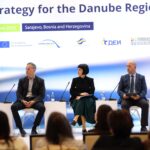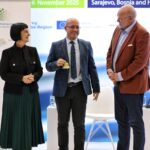The 12th Danube Participation Day 2025 gathered representatives of civil society, local authorities, and EU institutions to discuss how bottom-up initiatives can contribute to the European integration process. Hosted under Bosnia and Herzegovina’s Presidency of the EU Strategy for the Danube Region (EUSDR), the event was organised by the Danube Civil Society Forum/Foster Europe and the City of Vienna, Priority Area 10 “Institutional Capacity and Cooperation,” in cooperation with the Local Democracy Agency (LDA) Mostar.
After the opening remarks delivered by Midhat Džemić from the Directorate for European Integration of Bosnia and Herzegovina, Stefan August Lütgenau from the Danube Civil Society Forum/Foster Europe, and Claudia Singer-Smith of the City of Vienna, EUSDR PA10, the panel discussion “Bridging the Gap: Integrating Local Bottom-Up Initiatives into the EU Enlargement Agenda” brought together representatives of the European Commission, the EU Delegation to Bosnia and Herzegovina, NALAS – Network of Associations of Local Authorities of South-East Europe, and the Centre for Civil Society Promotion. The exchange focused on how local actors can drive inclusive, participatory approaches within the EU enlargement framework.
A key part of the event was the Danube Participation Agora and World Café sessions, where participants engaged in interactive discussions on strengthening civil society, municipalities, and youth participation in shaping European policies. The conclusions and insights gathered during the World Café were presented the following day at the 14th Annual Forum of the EU Strategy for the Danube Region, highlighting the importance of local perspectives in regional and European policymaking.
In the session “Funders Talks: Boosting Development in the Danube Region”, panelists Johannes Gabriel from the Danube Region Programme, George Petrov of the Citizens Participation Forum, and LDA Mostar’s director Dženana Dedić shared their insights, with Dedić representing the perspective of civil society organisations from Bosnia and Herzegovina as a candidate country. She highlighted funding challenges and the importance of building transparent, sustainable partnerships.
“Civil society organizations should ensure financial sustainability through diversification of income sources, capacity building, partnerships, and transparency, in order to remain a relevant and reliable partner in the development of the Danube Region and the creation of European policies,” Dedić concluded.
The event closed with the symbolic Passing the Bell ceremony, marking the handover within the EUSDR – from Dženana Dedić of the LDA Mostar to George Petrov of the Citizens Participation Forum, as Bulgaria takes over the Presidency from Bosnia and Herzegovina. The gesture reaffirmed the shared commitment to continued collaboration for a stronger, more participatory Danube Region.







